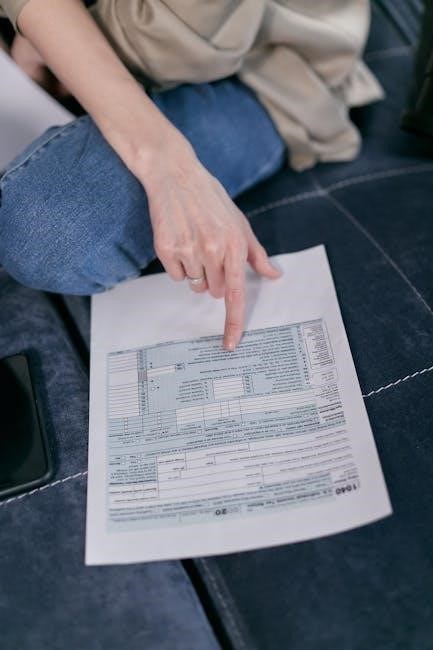The PA-65 form is used for reporting income and specific transactions by S corporations and partnerships in Pennsylvania, ensuring compliance with state tax regulations effectively.
Overview of PA 65
The PA-65 form is an information return required for S corporations and partnerships operating in Pennsylvania. It is designed to report income, losses, and specific transactions related to business, professional, or farm activities. The form ensures compliance with state tax regulations and is filed annually. PA-65 is essential for entities to accurately determine and report their Pennsylvania-specific income, which may differ from federal reporting. It includes schedules like Schedule M for reconciling federal income to state income and Schedule H-Corp for corporate net income tax calculations. The responsible official must ensure all required schedules are submitted along with the main form. PA-65 also addresses ownership interests in other partnerships or disregarded entities, ensuring transparency and proper reporting of financial activities.
Purpose of PA 65 Instructions
The purpose of PA-65 instructions is to guide S corporations and partnerships in accurately reporting income, losses, and transactions specific to Pennsylvania. These instructions ensure compliance with state tax laws and clarify filing requirements for businesses, professions, and farm activities. They provide detailed guidance on completing the PA-65 Information Return, including schedules like Schedule M for reconciling federal and state income and Schedule H-Corp for corporate net income tax. The instructions also address ownership interests in other partnerships or disregarded entities, ensuring proper reporting of financial activities. Additionally, they outline procedures for final withholding and catch-up payments for nonresidents, helping entities meet all Pennsylvania tax obligations effectively and efficiently.
Who Needs to File PA 65?
The PA-65 form is required for certain S corporations, partnerships, and other entities conducting business in Pennsylvania. Specifically, S corporations and partnerships with total Pennsylvania gross income exceeding $10,000 must file PA-65. Additionally, entities with Pennsylvania-source income from a business, profession, or farm activity, regardless of the amount, are also required to file. This includes entities with nonresident members who have Pennsylvania-source income. The filing obligation ensures accurate reporting of income, deductions, and credits at the state level, aligning with Pennsylvania tax regulations. Failure to file may result in penalties, making it essential for eligible entities to comply with this requirement.

Eligibility Criteria
Eligibility for filing PA-65 applies to S corporations, partnerships, and other entities with Pennsylvania gross income exceeding $10,000 or engaged in specific business activities within the state.
PA S Corporation or Partnership Requirements
PA S corporations and partnerships must meet specific criteria to file PA-65. S corporations and partnerships with Pennsylvania-sourced gross income exceeding $10,000 must file. Entities engaged in business, professional, or farming activities within the state also qualify. Additionally, federal reporting requirements for these entities trigger the need to submit PA-65. S corporations must issue Schedule K-1s to shareholders, while partnerships provide Schedule K-1s to partners. Both entities must complete Schedule M to report income, deductions, and credits. Federal S or partnership status determines eligibility, and compliance with Pennsylvania tax laws is mandatory. Failure to meet these requirements may result in penalties. Proper documentation, including federal forms and state-specific schedules, ensures accurate filing.
Business, Profession, or Farm Activities
Entities engaged in business, professional, or farm activities within Pennsylvania must file PA-65 if their gross income from these activities exceeds $10,000. Business activities include commercial ventures, such as retail, manufacturing, or services. Professional activities involve services like medical, legal, or consulting practices. Farm activities pertain to agricultural operations, including crop cultivation and livestock raising. These activities must have a nexus in Pennsylvania to trigger filing requirements. Accurate reporting of income and deductions from these activities is essential for compliance with state tax laws. Proper documentation, such as ledgers and receipts, supports the accuracy of reported figures. Failure to report these activities may result in penalties or delayed processing of the return.
Relevance of Transaction Names and Federal Reporting
The accuracy of transaction names and alignment with federal reporting are critical for PA-65 compliance. Transactions must be clearly identified to ensure proper classification under Pennsylvania tax laws. While federal reporting provides a foundation, Pennsylvania may have specific rules that differ. For example, certain income or deductions recognized federally may be treated differently at the state level. Proper naming helps prevent mismatches during audits and ensures compliance with state-specific regulations. Filers must cross-reference federal forms with Pennsylvania requirements to avoid discrepancies. Accurate transaction naming also aids in reconciling federal and state income, ensuring proper reporting on PA-65 schedules. Consistency in naming conventions supports seamless integration of federal and state reporting obligations.

Key Components of PA 65
The PA-65 form includes the information return, various schedules (H-Corp, CP, M), and requirements for responsible officials to ensure accurate and compliant reporting.
PA-20S/PA-65 Information Return
The PA-20S/PA-65 Information Return is a combined form used by S corporations and partnerships to report income, deductions, and credits to the Pennsylvania Department of Revenue. It consolidates federal and state-specific requirements, ensuring compliance with both jurisdictions. The form includes sections for entity-level information, income reconciliation, and federal income reporting adjustments. Attachments like Schedule M and Schedule H-Corp provide additional details on income distributions and tax credits. Accurate completion is critical to avoid penalties, as errors may delay processing. Filers must ensure all required schedules and supporting documents are included. Proper preparation involves reconciling federal income with Pennsylvania-specific rules and verifying all data for accuracy. Consulting official instructions or a tax professional is recommended for complex cases.
PA-20S/PA-65 Schedules (H-Corp, CP, M, etc.)
The PA-20S/PA-65 form includes several schedules that provide detailed information about the entity’s activities and tax obligations. Schedule H-Corp is used by S corporations to report income, deductions, and credits at the entity level. Schedule CP is specific to partnerships and details partner-specific items, such as distributive shares and guaranteed payments. Schedule M reconciles federal income with Pennsylvania income, ensuring accurate state-specific reporting. Other schedules, like Schedule RK-1, are used for withholding tax reporting and nonresident withholding payments. Each schedule serves a unique purpose, ensuring compliance with Pennsylvania tax laws. Proper completion of these schedules is essential for accurate filing and avoiding penalties. Filers must carefully review instructions for each schedule to ensure all required information is included. This ensures seamless processing by the Department of Revenue.
Responsible Official Filing Requirements
A responsible official is required to sign and file the PA-20S/PA-65 return on behalf of the entity. This official, such as an officer, partner, or member, must ensure the accuracy and completeness of the information reported. They are also responsible for maintaining records to support the data provided. The official must sign and date the return, and their title, name, and contact information must be included. Failure to comply with these requirements may result in penalties. The responsible official acts as the primary point of contact for the Pennsylvania Department of Revenue regarding the filing. They must ensure all schedules and attachments are properly completed and submitted with the return. This ensures compliance with state tax regulations and avoids delays in processing. Proper documentation and adherence to these requirements are essential for a smooth filing process.

Filing Requirements
Entities must file PA-65 with PA-20S, including all required schedules and attachments. Ensure accuracy and completeness of information. Electronic filing is strongly encouraged by the Department of Revenue.
Mail Address for PA-20S/PA-65 Submissions
The PA-20S/PA-65 forms and schedules must be mailed to the Pennsylvania Department of Revenue. The correct mailing address is PA Department of Revenue, P.O. Box 280601, Harrisburg, PA 17128-0601. For private delivery services, use PA Department of Revenue, Bureau of Individual Taxes, 1101 Commonwealth Ave., Harrisburg, PA 17125. Ensure the envelope is properly addressed and includes all required documentation. Using the correct address prevents delays in processing. Always double-check the address before mailing to avoid any issues. Timely submission is crucial to meet filing deadlines and avoid penalties. Make sure to include all schedules, attachments, and payments, if applicable, to ensure compliance with state tax regulations.
Payment Instructions (ES and FEIN)
Payments for PA-20S/PA-65 filings must be accompanied by the proper documentation and identification. Use your Federal Employer Identification Number (FEIN) on all payment submissions to ensure accurate processing. Payments can be made electronically through the Pennsylvania Department of Revenue’s PA-20S/PA-65 filing system or by check. If paying by check, make it payable to the PA Department of Revenue and include your FEIN on the check. For electronic payments, follow the online instructions carefully to avoid errors. Always verify the payment amount aligns with the totals reported on the forms. Incorrect or incomplete payments may result in processing delays or penalties. Ensure timely submission to meet filing deadlines and avoid late payment fees. Proper payment handling is essential for compliance with state tax regulations.

Withholding Payments for Nonresidents
Nonresident individuals receiving income from Pennsylvania sources may be subject to state withholding requirements. Employers and payers must withhold Pennsylvania income tax on such payments, especially for nonresident partners or shareholders. Use Form PA-20S/PA-65 Schedule RK-1 to report withholding amounts and allocate them to nonresident recipients. Ensure accurate reporting of each nonresident’s share, including their Social Security or FEIN number. Payments must be remitted quarterly if the total annual liability exceeds $1,000. File the annual reconciliation by April 15th. Include the payer’s FEIN on all submissions. Timely and accurate withholding payments prevent penalties and ensure compliance with Pennsylvania tax laws. Always verify nonresident status and applicable income sources to avoid errors in withholding calculations.

Specific Schedules and Their Purposes
The PA-20S/PA-65 form includes specific schedules for different entity types, such as S corporations, partnerships, and limited liability companies, each detailing unique reporting requirements and purposes.
PA-20S/PA-65 Schedule M
Schedule M is used to reconcile differences between federal taxable income and Pennsylvania taxable income. It is required for businesses to report adjustments due to differences in federal and state tax laws. This schedule ensures accurate reporting of income, deductions, and credits specific to Pennsylvania. Entities must detail modifications such as depreciation differences, income recognition, and other adjustments. Schedule M helps ensure compliance with Pennsylvania tax regulations and proper alignment with federal tax filings. It is essential for businesses to accurately complete this schedule to avoid discrepancies and ensure correct state tax calculations. This section is critical for maintaining compliance and ensuring accurate financial reporting.
PA-20S/PA-65 Schedule H-Corp
Schedule H-Corp is used by corporations electing H status to report specific financial activities. It is designed for entities classified as H corporations under federal tax law. This schedule requires detailed reporting of income, deductions, and credits unique to H corporations. Businesses must provide information about their H corporation status, including any elections or changes in status. The schedule also addresses apportionment and allocation of income for corporations operating in multiple states. Accurate completion of Schedule H-Corp ensures compliance with Pennsylvania tax laws for H corporations. It is essential for entities to review federal elections and ensure alignment with state reporting requirements. Proper filing of this schedule helps avoid discrepancies and ensures accurate tax calculations.
PA-20S/PA-65 Schedule CP
Schedule CP is used to report withholding taxes for nonresident owners, members, or shareholders of pass-through entities. It is required for entities with nonresident individuals who have income sourced from Pennsylvania. The schedule details the withholding tax obligations, including the amount of income allocated to nonresidents and the taxes withheld. Entities must report the names, addresses, and tax identification numbers of nonresident owners. Schedule CP also includes information about credits for taxes paid to other states. The form must be filed annually, and copies of federal Schedule K-1 and state-specific forms may be required. Accurate completion of Schedule CP ensures compliance with Pennsylvania withholding requirements for nonresidents. Proper reporting helps avoid penalties and ensures correct tax attribution for all parties involved. Detailed instructions are provided in the PA-65 guidance to assist filers.
PA-20S/PA-65 Schedule RK-1
Schedule RK-1 is used to report withholding taxes for nonresident owners, members, or shareholders of pass-through entities. It details the Pennsylvania income allocated to nonresidents, the tax withheld, and any credits for taxes paid to other states. Filers must include the owner’s name, address, and tax identification number. This schedule ensures compliance with Pennsylvania’s withholding requirements for nonresidents. Accurate completion helps avoid penalties and ensures proper tax attribution. Entities must submit Schedule RK-1 annually, along with copies of federal Schedule K-1 and state-specific forms. Detailed instructions are provided in the PA-65 guidance to assist filers. Proper reporting is essential for maintaining compliance and ensuring all parties meet their tax obligations. This schedule is a critical component of the PA-65 filing process for entities with nonresident owners.

Reconciliation and Adjustments
Reconciliation and adjustments ensure accuracy by aligning federal income with Pennsylvania-specific classifications and modifications, preventing discrepancies and ensuring compliance with state tax regulations.
Reconciling Federal Income to Pennsylvania Income
Reconciling federal income to Pennsylvania income is essential for ensuring compliance with state tax regulations. This process involves adjusting federal taxable income to account for Pennsylvania-specific modifications. Businesses must report differences in income classification, deductions, and credits between federal and state requirements. Key adjustments include items such as depreciation differences, certain deductions disallowed by Pennsylvania, and additions for income not subject to federal tax but taxable at the state level. Proper reconciliation ensures accurate reporting of taxable income and prevents discrepancies. Taxpayers must complete relevant schedules, such as Schedule M, to document these adjustments. This step is critical for S corporations and partnerships to align their federal and state tax filings and avoid potential penalties for noncompliance.
Adjustments for Reportable Classified Income (Loss)
Adjustments for reportable classified income (loss) are necessary to align financial statements with Pennsylvania tax reporting requirements. Businesses must classify income and losses according to specific categories, such as rental income, interest, or royalties, to ensure proper tax treatment. Adjustments may involve reclassifying items reported on federal returns to conform to state definitions or accounting for disallowed deductions. Proper classification prevents mismatches between federal and state filings. Taxpayers should review Schedule M and other relevant schedules to ensure accurate reporting of classified income and losses. Failure to make these adjustments can lead to discrepancies and potential penalties. This step ensures compliance with Pennsylvania tax laws and accurate representation of taxable income.

Other Information and Disclosures
This section requires taxpayers to disclose additional information not covered elsewhere, ensuring compliance with Pennsylvania tax laws and accurate reporting of all relevant financial details.
SECTION VII: Other Information
Section VII of the PA-65 instructions requires filers to disclose additional information not addressed elsewhere in the form. This includes details about non-traditional or unique financial arrangements, compliance with specific state regulations, or any other obligations tied to the entity’s tax status. Filers must report any transactions or events that could impact their tax liability in Pennsylvania, even if not directly covered by other sections. This ensures transparency and accuracy in tax reporting. Failure to disclose such information may result in penalties or delays in processing. It is essential to review all disclosures carefully to avoid errors or omissions. Additional guidance for complex cases can be found in the Pennsylvania Department of Revenue’s resources or by consulting a tax professional.
Ownership in Partnerships or Disregarded Entities
For entities filing PA-65, ownership in partnerships or disregarded entities must be fully disclosed. This includes listing all partners, members, or owners with a vested interest, including their names, addresses, ownership percentages, and Employer Identification Numbers (EINs). Disregarded entities, such as single-member LLCs, must also report ownership details. Filers must indicate whether ownership interests changed during the tax year and provide specifics of such changes. This information ensures proper allocation of income, deductions, and credits among owners. Accurate reporting is critical to avoid penalties or delays in processing. Failure to disclose ownership details may result in compliance issues. Consult the instructions or a tax professional for complex ownership structures or uncertain reporting requirements.
Final Withholding and Catch-Up Payments
Final withholding and catch-up payments are essential to ensure compliance with Pennsylvania tax obligations. For pass-through entities, the final payment is due by April 15th of the following tax year and should include any remaining tax liability after estimated payments. Nonresident individual owners must ensure withholding payments are made by January 31st of the following year. Catch-up payments are required if prior estimates were insufficient or if additional income was realized. Failure to meet these deadlines may result in penalties and interest. Ensure all payments are accompanied by a completed Schedule RK-1 to properly allocate credits. Accurate and timely payments are critical to avoid compliance issues. Consult the instructions or a tax professional for complex scenarios or uncertainties regarding final payments.

Filing Deadlines and Updates
Adhering to deadlines ensures timely compliance. PA-20S/PA-65 submissions are due by April 15th, with extensions available. Stay informed about form updates to maintain accurate filings and avoid penalties.
2024 Tax Year Filing Deadline
The 2024 tax year filing deadline for PA-20S/PA-65 forms is April 15, 2024. This deadline applies to all S corporations, partnerships, and other entities required to file these forms. Extensions are available upon request, but the request must be submitted by the original due date. Taxpayers can file for an automatic six-month extension using federal Form 7004 or Pennsylvania-specific methods. Late filings may result in penalties and interest, so it’s crucial to adhere to the deadline. The Pennsylvania Department of Revenue may announce updates or changes closer to the filing period, so checking their official website for the latest information is recommended. Proper planning and timely submission ensure compliance and avoid unnecessary complications. Staying informed about any deadline adjustments is essential for accurate filing. Always verify the final submission date and requirements before filing to avoid delays or errors. Timely filing helps maintain good standing with state tax authorities. Additionally, extensions should be used wisely, as they only postpone the filing date, not the payment deadline. Ensuring all necessary documentation and schedules are prepared in advance can streamline the filing process. By meeting the April 15 deadline, entities can fulfill their obligations without incurring additional fees or penalties. Planning ahead and staying organized are key to a seamless filing experience. Lastly, consult the Pennsylvania Department of Revenue’s guidelines for any specific instructions or updates related to the 2024 tax year filing requirements. This ensures all submissions are accurate and compliant with current regulations. Proactive preparation and attention to deadlines are vital for a smooth filing process. Always prioritize accuracy and timeliness when submitting PA-20S/PA-65 forms. Regularly reviewing the Department of Revenue’s updates helps prevent missed deadlines and ensures compliance with all requirements. Staying proactive and informed is the best approach to managing tax obligations effectively. By adhering to the April 15, 2024, deadline, entities can maintain compliance and avoid potential penalties. Proper planning and timely action are essential for a successful filing experience. Finally, leveraging available resources, such as extension requests and official guidelines, can help manage the filing process efficiently. Ensuring all necessary steps are taken by the deadline guarantees a smooth and penalty-free experience. Timely filing is a critical component of maintaining good standing with tax authorities. Always prioritize the April 15 deadline to avoid complications. Proper preparation and adherence to deadlines are essential for compliance. Staying informed and organized ensures a seamless filing process. By meeting the 2024 tax year deadline, entities can fulfill their obligations without issues. Timely filing is crucial for avoiding penalties and maintaining compliance. Always verify the deadline and submission requirements to ensure accuracy. Proactive planning and attention to detail are key to a successful filing experience. Lastly, staying updated on any changes ensures compliance with all regulations. Timely filing is essential for a penalty-free experience. Always adhere to the April 15, 2024, deadline for PA-20S/PA-65 submissions. Proper preparation and organization are vital for meeting this deadline. Ensuring all necessary documentation is ready in advance streamlines the process. By prioritizing the deadline, entities can avoid complications and maintain compliance. Timely filing is a critical aspect of tax obligations. Always stay informed and organized to meet the April 15 deadline. Proper planning and attention to detail ensure a smooth filing experience. Staying proactive and informed helps prevent missed deadlines and penalties. Timely submission of PA-20S/PA-65 forms is essential for compliance. Always adhere to the April 15, 2024, deadline to avoid issues. Proper preparation and organization are key to a successful filing process. By staying informed and organized, entities can meet the deadline with ease. Timely filing ensures compliance and avoids penalties. Always prioritize the April 15 deadline for PA-20S/PA-65 submissions. Proper planning and attention to detail are crucial for a seamless experience. Staying proactive and informed helps maintain good standing with tax authorities. Timely filing is essential for avoiding complications. Always adhere to the deadline and submission requirements. Proper preparation ensures accuracy and compliance. Staying organized and informed guarantees a smooth filing process. Timely submission of PA-20S/PA-65 forms is vital for meeting tax obligations. Always prioritize the April 15, 2024, deadline to avoid penalties. Proper planning and organization are essential for a successful filing experience. By staying informed and proactive, entities can ensure compliance and avoid delays. Timely filing is crucial for maintaining good standing with tax authorities. Always adhere to the deadline and submission guidelines. Proper preparation and attention to detail ensure accuracy and compliance. Staying organized and informed guarantees a seamless filing process. Timely submission of PA-20S/PA-65 forms is essential for meeting tax obligations. Always prioritize the April 15 deadline to avoid complications. Proper planning and organization are key to a successful filing experience. By staying proactive and informed, entities can ensure compliance and avoid penalties. Timely filing is crucial for maintaining good standing with tax authorities. Always adhere to the deadline and submission requirements. Proper preparation ensures accuracy and compliance. Staying organized and informed guarantees a smooth filing process. Timely submission of PA-20S/PA-65 forms is vital for meeting tax obligations. Always prioritize the April 15, 2024, deadline to avoid issues. Proper planning and attention to detail are essential for a seamless experience. By staying informed and organized, entities can meet the deadline with ease. Timely filing ensures compliance and avoids penalties. Always adhere to the deadline and submission guidelines. Proper preparation and organization are crucial for a successful filing process. Staying proactive and informed helps maintain good standing with tax authorities. Timely submission of PA-20S/PA-65 forms is essential for meeting tax obligations. Always prioritize the April 15 deadline to avoid complications. Proper planning and organization are vital for a smooth filing experience. By staying informed and organized, entities can ensure compliance and avoid delays. Timely filing is crucial for maintaining good standing with tax authorities. Always adhere to the deadline and submission requirements. Proper preparation ensures accuracy and compliance. Staying organized and informed guarantees a seamless filing process. Timely submission of PA-20S/PA-65 forms is essential for meeting tax obligations. Always prioritize the April 15, 2024, deadline to avoid penalties. Proper planning and attention to detail are key to a successful filing experience. By staying proactive and informed, entities can ensure compliance and avoid issues. Timely filing is crucial for maintaining good standing with tax authorities. Always adhere to the deadline and submission guidelines. Proper preparation and organization are vital for a seamless filing process. Staying informed and organized guarantees a smooth experience. Timely submission of PA-20S/PA-65 forms is essential for meeting tax obligations. Always prioritize the April 15 deadline to avoid complications. Proper planning and attention to detail are crucial for a successful filing experience. By staying informed and organized, entities can meet the deadline with ease. Timely filing ensures compliance and avoids penalties. Always adhere to the deadline and submission requirements. Proper preparation and organization are key to a seamless filing process. Staying proactive and informed helps maintain good standing with tax authorities. Timely submission of PA-20S/PA-65 forms is vital for meeting tax obligations. Always prioritize the April 15, 2024, deadline to avoid issues. Proper planning and attention to detail are essential for a successful filing experience. By staying informed and organized, entities can ensure compliance and avoid delays. Timely filing is crucial for maintaining good standing with tax authorities. Always adhere to the deadline and submission guidelines. Proper preparation ensures accuracy and compliance. Staying
Recent Updates to PA-20S/PA-65 Forms
The Pennsylvania Department of Revenue has introduced several updates to the PA-20S/PA-65 forms for the 2024 tax year. These changes aim to streamline reporting and enhance compliance with federal tax regulations. Key updates include the addition of new schedules to accommodate emerging business structures, such as special allocations for pass-through entities. Additionally, there are revised instructions for reporting certain types of income, including guaranteed payments and qualified business income (QBI). The department has also emphasized the importance of electronic filing, with mandatory e-file requirements for entities with 25 or more partners or shareholders. Furthermore, updates have been made to the withholding payment guidelines, particularly for nonresident owners. Taxpayers are advised to review the updated instructions and schedules carefully to ensure accurate and timely submissions. The Pennsylvania Department of Revenue regularly posts updates on its official website, so filers should check for the most current information before submitting their returns. Proper adherence to these updates ensures compliance and avoids potential penalties. Staying informed about these changes is crucial for a smooth filing process. Always refer to the latest resources provided by the Department of Revenue for the most accurate guidance. This ensures all submissions align with current regulations. Regular updates help maintain clarity and reduce the risk of errors. By incorporating these changes, filers can ensure their PA-20S/PA-65 forms meet all requirements for the 2024 tax year. Timely adaptation to these updates is essential for maintaining compliance. Always prioritize reviewing official resources for the latest information. This proactive approach ensures accurate and efficient filing. Recent updates reflect the department’s commitment to aligning state reporting with federal standards. Staying informed guarantees a seamless filing experience. Always verify the latest updates before submission to avoid complications. Proper understanding of these changes ensures compliance and prevents delays. Timely adaptation to updates is crucial for accurate reporting. Always consult the Pennsylvania Department of Revenue’s official guidelines for the most current information. This ensures all submissions are in line with the latest requirements. Recent updates are designed to enhance reporting accuracy and streamline the filing process. By staying informed, filers can navigate these changes effectively. Always review the latest updates to ensure compliance and avoid penalties. Proper preparation and attention to detail are essential for a successful filing experience. Recent updates to PA-20S/PA-65 forms are intended to improve reporting efficiency and clarity. Always refer to the official resources for the most accurate and up-to-date information. This ensures all submissions meet the current requirements. Staying proactive and informed guarantees a smooth filing process. Always prioritize reviewing recent updates to maintain compliance. Proper understanding of these changes ensures accurate and timely submissions. Recent updates reflect the department’s efforts to modernize and simplify tax reporting. Always consult the latest guidelines to ensure adherence to all requirements. This proactive approach guarantees a seamless filing experience.
Guides for Resolving Common Issues

Additional Resources
The Pennsylvania Department of Revenue provides comprehensive resources, including official forms, tax guides, and contact information, to assist with PA-65 filings. Visit their website for detailed instructions and support.







